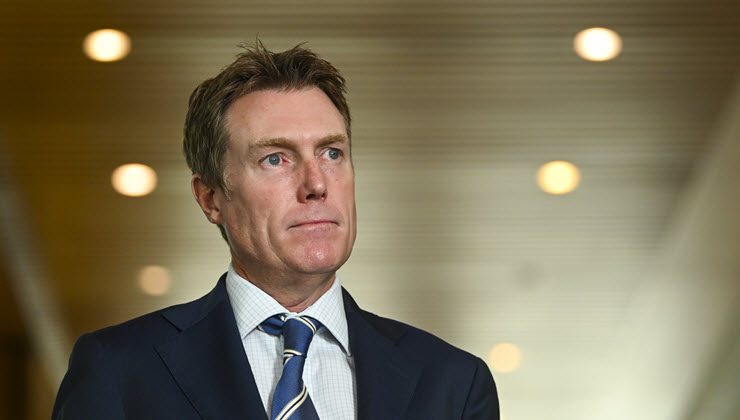Four Corners’ revelations have burst the Canberra bubble. If claims about Christian Porter are true he must go.
The rush by the government and its media supporters to attack last night’s Four Corners as not in the public interest is not merely wrong, but offensively so.
The campaign was led by Liberal minders in the weeks before the program went to air trying to prevent the ABC from broadcasting it, including by contacting the board, then Liberal senators in a special Senate estimates sitting yesterday attacking it, and then News Corp’s bloviator-in-chief Paul Kelly tried to argue on Q+A last night that Four Corners had gone beyond normal standards of what was in the public interest in covering politicians’ personal lives.
Kelly and the Liberals he was trying to cover up for couldn’t be more wrong. The revelations about Alan Tudge and Christian Porter were very much in the public interest.
When the Barnaby Joyce affair broke in 2018, Crikey was virtually alone in the media in criticising the revelations on the basis that they had no public interest value. I called it “shameful non-journalism”. It was not, to put it mildly, a popular stance. But Four Corners revealed things very much in the public interest in a way that was never the case for Joyce.
First, Tudge. Four Corners reporter Louise Milligan’s point that he was an opponent of marriage equality isn’t the half of it.
Tudge has form in using personal information for political purposes. He authorised the release of confidential, private government information about Andie Fox, a critic of the government’s illegal, immoral robodebt scheme, so that a blogger could attack her in The Canberra Times. He then defended his actions as not just legal, but fair.
He thus set the standard down in the gutter: the use of private, confidential information is perfectly legitimate for partisan purposes. He can have no complaints whatever after the shameful thing he did to Fox.
That’s even before you get to Rachelle Miller so bravely wanting to tell of the hurt and pain she experienced as a result of her relationship with Tudge, and deserves a platform to do so.
Tudge has issued an apology. Will he think twice next time before using private information held by the government to smear a critic?
As for Porter, the public interest case is even stronger.
Porter denies the claims made by Four Corners, despite their corroboration and despite — according to Miller — Tudge’s furious efforts to force a journalist to erase photographic evidence of his public intimacy with a staffer.
He also complains — using very careful language — that he wasn’t contacted specifically by Milligan, even though he was repeatedly contacted by the ABC about the story.
But if the allegations — many corroborated — about Porter’s public drunkenness, unwanted sexual advances and affairs have any truth, his conduct is utterly inappropriate for a cabinet minister and certainly the attorney-general, supposedly the first law officer of Australia.
But it’s much worse for Porter. If there is any truth to the allegations, he is clearly a security risk in a key position in Australia’s national security apparatus. His alleged behaviour — again, allegations corroborated by more than one party — would place him at grave risk of compromise by foreign intelligence services or organised crime.
Even the potential for compromise is grounds for suspension or dismissal inside intelligence services. Former prime minister Malcolm Turnbull, who admitted he would have vetted Porter more if he’d been aware of the Four Corners material, was remiss to promote him without more due diligence on the potential security risk.
Porter, remember, is the man who authorised the prosecution of Witness K and Bernard Collaery, who has attempted to keep their prosecutions secret on the pretext of national security, and who has systematically delayed and dragged out Collaery’s trial for years — also on the pretext of national security.
The idea that this party boy, while allegedly engaging in such compromising behaviour, is persecuting and harassing two patriots who have served their country so well on the basis that they are a threat to national security is utterly sickening.
What else do we not know about Christian Porter? What do third parties know about him that he would prefer to keep secret?
In a government that insists it’s all about national security, Porter must be sacked.
How must the government act to fix the Canberra bubble? Let us know your thoughts by writing to [email protected]. Please include your full name to be considered for publication in Crikey’s Your Say section.




A lot can happen in 3 months.
3 months is a long time in 2020. Join us to make sense of it all.
Get you first 12 weeks of Crikey for just $12. Cancel anytime.
Peter Fray
Editor-in-chief of Crikey








